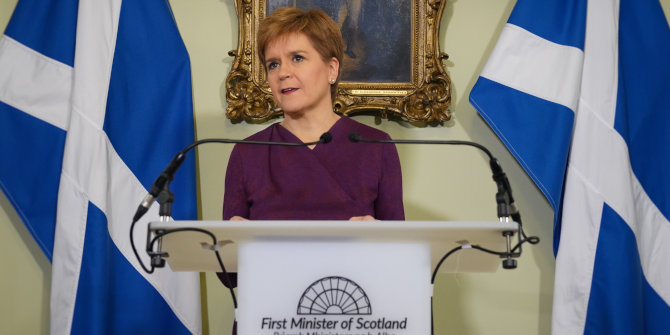Research suggests there is a growing ideological gap between young men and women across the world. Felipe Carozzi and Andrés Gago present evidence from Spain that can provide a partial explanation for this phenomenon.
Over the past few months, there has been extensive coverage in the press and social media of the widening ideological gaps emerging between young men and women in many countries. Much of this attention came after a recent Financial Times article elaborating on research carried out by Alice Evans, a Senior Lecturer at King’s College London and Visiting Fellow at Stanford University. This research indicates that the women of Generation Z are becoming more progressive than their male counterparts.
This is an intriguing development both due to its implications for the future and its unknown origins. There has been no shortage of potential explanations put forward to account for this change. Some of the more popular include that it is a symptom of the use of social media, a new expression of the “culture wars”, a result of different policy preferences or some combination of all of the above.
Evidence from Spain
In a recent study, we present research that could provide a partial explanation for this phenomenon. We assess differences in the willingness of political parties to engage in gender-sensitive policies. We seek to understand how the characteristics of political leaders affect their propensity to implement policies such as pre-schooling or long-term care services that, in practice, benefit women disproportionately. For this purpose, we focus on the case of Spanish local governments, which have the capacity to implement these policies at will.
It is worth noting that Spain is one of the (many) countries that feature an increasing ideological gender gap among young voters, and that the policies that we explore are highlighted by many international organisations, including the European Parliament, as key policies for fostering gender equality.
In terms of the characteristics of politicians that we focus on, we test whether female mayors are more likely to implement gender-sensitive policies than their male counterparts. This is motivated by a literature championed by Raghabendra Chattopadhyay and Esther Duflo, studying differences by gender in the propensity to implement different policies (see this paper for a review).
We also test whether centre-right Partido Popular (PP) mayors differ from other mayors in their propensity to implement these policies. Studies documenting a difference (or the absence of a difference) in policy across partisan divides abound. What we do is study this question in relation to policies that arguably benefit women disproportionately.
Our study relies on a close election regression discontinuity design for estimation. In a nutshell, we use tight races (also known as close elections) as a way of “randomising” the identity of the mayor in Spanish municipalities. We then exploit this local randomisation to estimate the effect of gender or partisan identity on our outcomes of interest.
We complement this with panel estimates relying on variation over time across municipalities to estimate our parameters of interest. We use data on more than 5,000 Spanish municipalities covering the period between 2010 and 2014, where municipal budget laws required detail records of spending figures in the policies of interest. Details of the analysis can be checked in the open-access version of our paper.
What do we find?
Arguably our most important finding is that we do not detect significant differences by mayoral gender in the propensity that a municipal government engages in gender-sensitive policies. The second key finding is that there are differences in gender-sensitive policies by party: centre-right PP mayors are less likely to preside over local governments that engage in these policies. The leader’s gender does not affect their propensity to promote gender-sensitive policies, but their party does. We rationalise this by noting that Spain is a country with strong parties, in which individual characteristics of local leaders matter less than their party when it comes to policy.
This brings us back to the gender ideology gap. Our findings point to significant differences by party in the propensity to engage with gender-sensitive policies. Specifically, mayors from the centre-right PP were less likely than mayors to their left to introduce preschool or long-term care services. This is observed in a context in which these policies were becoming increasingly common.
If these policies are indeed valued by women – survey evidence indicates this is the case – then it is perhaps natural that Spanish women are becoming increasingly more prone to support left-leaning parties. If politics determines who obtains “what, when and how”, it is reasonable to suppose that electoral loyalties will, to some degree, reflect the benefits associated with the menu of policies offered by each political camp.
Naturally, as highlighted by Alice Evans, other factors of a more cultural nature can all contribute to widening ideological gaps by gender. Yet, it is in a sense comforting to find that policy differences can also influence this divergence through more direct, predictable channels.
For more information, see the authors’ accompanying paper in the Journal of Economic Behaviour and Organisation
Note: This article gives the views of the authors, not the position of EUROPP – European Politics and Policy or the London School of Economics. Featured image credit: G-Stock Studio / Shutterstock.com




